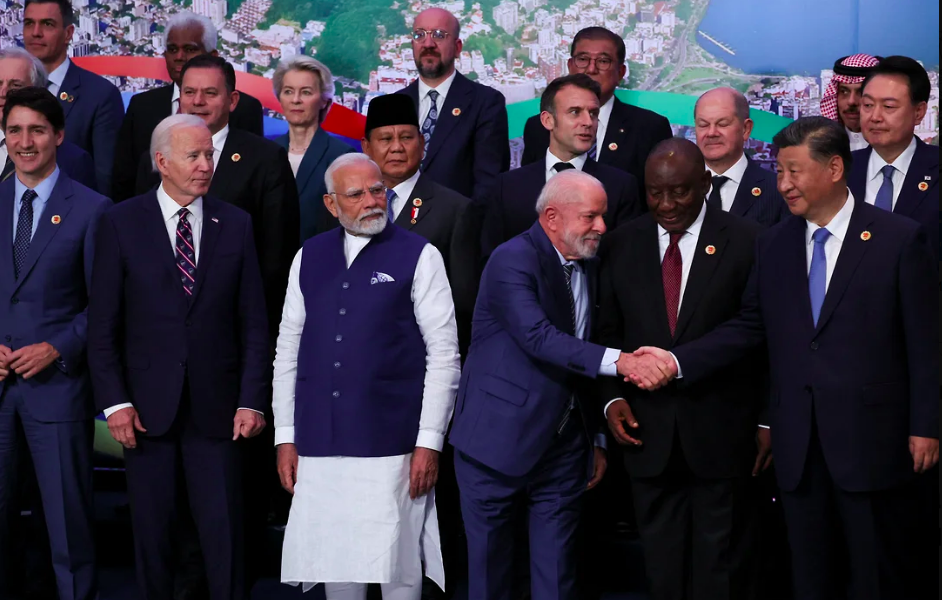G20 member countries have set a period of the next five years to completely eradicate poverty across the globe, according to the outcome of their just concluded summit held in Brazil, November 18-19.
The G20 summit leaders tried to focus their attention on the problems of poverty, climate, and economic development. However, in the context of the crises in the Middle East and Ukraine, it was impossible to avoid geopolitical discussions.
President Luiz Inacio Lula da Silva observed, “I attended the first meeting of G20 leaders in Washington after the 2008 financial crisis. Sixteen years later, I regret to say that the world is in a worse situation.”
He quickly explained his assessment: record numbers of forcibly displaced persons and armed conflicts since World War II, extreme weather events, and growing social, racial and gender inequality—all of which, according to the Brazilian leader, characterize the current reality.
“The main symbols of the common tragedy,” Lula da Silva is sure, are hunger and poverty.
These phenomena, according to him, are primarily the result of incorrect political decisions. “Those who are present at this table must solve the urgent task of eradicating this scourge that disgraces humanity,” the Brazilian president shared his vision of the situation.
The culmination of Brazil’s G20 presidency’s efforts was the creation of the Global Alliance to Fight Hunger and Poverty, announced on Monday.
The alliance is expected to allow for the exchange of experiences in ensuring food security and the coordination of relevant measures. “This will be our greatest legacy,” Lula da Silva did not mince words.
Brazil’s presidency was marked by other achievements, which are mentioned in the final declaration, such as the Task Force on Global Mobilization against Climate Change, as well as the Brazilian initiative to reform the global governance system.
Meanwhile, the preparation of the declaration was not without controversy.
Even before the summit began, it became clear that the G20 member countries had different ideas about the principles on which global problems should be solved and what should be considered problems in general.
Ahead of the Rio meetings, the Argentine government, led by libertarian President Javier Miley, had threatened to block the declaration over disagreements on taxation of the wealthiest citizens and gender equality.
An unnamed Brazilian official accused Buenos Aires of trying to turn the summit “into a struggle between old and new forces” and “create problems where there had previously been agreement.”
The Argentines, however, did not interfere with the adoption of the declaration, but signed it themselves with the proviso that they do not support a number of statements.
As stated by the presidential press service, among the points that the country’s authorities did not agree with were the regulation of social networks, the reform of global governance institutions, and “the very idea” that the state should intervene in the fight against hunger.
Controversy also arose around the declaration’s mention of the conflict in Ukraine.
As a result, paragraph 9 of the document notes: “With regard to the war in Ukraine specifically, with reference to the discussions held in New Delhi (at the 2023 G20 summit. — Taarifa ), we emphasize the impact of human suffering and the additional negative consequences of war on global food and energy security, supply chains, macro-financial stability, inflation and economic growth.”
The G20 participants also welcomed “all relevant and constructive initiatives that contribute to the establishment of a comprehensive, just and lasting peace and are consistent with all the purposes and principles of the UN Charter in the interests of promoting peaceful, friendly and good-neighborly relations among peoples.”
Point 8, however, takes up twice as much space and is devoted to “the catastrophic humanitarian situation in the Gaza Strip and the escalation in Lebanon.”
The Russian Foreign Ministry had previously called for not politicizing the summit agenda and focusing on economic issues.
At the final press conference in Rio de Janeiro, Russian Foreign Minister Sergey Lavrov described how the final version of the declaration was being agreed upon.
According to him, the decision to add a paragraph that is only indirectly related to the economy is an alternative to the West’s attempts to “Ukrainize” the summit agenda.
“Both we and our colleagues from the developing world insisted that the text be devoted to any conflicts, the need to resolve each conflict that currently persists on the globe, and above all, the conflict in the Middle East,” the head of the foreign policy department said.
According to Mr. Lavrov, the West “was reluctant to discuss this text, but understood perfectly well that without it there could be no section on conflicts.”
“There were attempts by the West to place this paragraph (on conflicts in the Middle East . — Taarifa), detailed, full of assessments, which emphasizes the tragic, catastrophic situation of the population of Gaza, after the Ukrainian one,” the diplomat noted.
“But here even we did not have to emphasize the rejection of such manipulation, juggling, because the countries of the Global South categorically refused to belittle the significance of the fact that the G20 should first of all pay attention to the tragedy of the Gaza Strip.”
Ultimately, as Mr. Lavrov explained, the Russian side agreed with the text of the clause on Ukraine, “because the main thing in it is a call for an honest and reasonable conversation about peace on a realistic basis.”




















